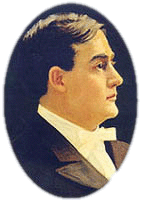|
|
Oscar Branch Colquitt (1861-1940), politician and governor, was born on December 16, 1861, at Camilla, Georgia, the son of Thomas Jefferson and Ann Elizabeth (Burkhalter) Colquitt, each of whom boasted some distinguished American ancestors. The family moved in 1878 to Daingerfield, Texas, where young Colquitt worked as a tenant farmer and attended the Daingerfield Academy one term. After a brief apprenticeship as a newspaperman, he founded the Gazette at Pittsburg, Texas, in 1884. He married Alice Fuller Murrell of Minden, Louisiana, on December 9, 1885, and the couple had four sons and one daughter. He sold the Gazette and published the Times-Star of Terrell, Texas, from 1890 to 1897. Colquitt served as state senator from 1895 to 1899 and was the author of delinquent-tax laws that earned him a statewide reputation. He was the state revenue agent during the last eight months of 1898 and, as the tax expert of a special tax commission, wrote the report that this commission submitted to the legislature in 1900. Colquitt acted as a paid lobbyist for several corporations during the sessions of 1899 and 1901 and also practiced law, having been admitted to the bar in 1900. He succeeded John H. Reagan as state railroad commissioner and served from 1903 to 1911. He made an unsuccessful run for governor in 1906 and was elected governor in 1910 as an anti-prohibitionist. After being reelected in 1912, he held the office until 1915. His administration achieved a reform of the prison system, improvement in the physical plants and management of the eleemosynary institutions, great advancement in the educational system, and a number of measures designed to improve the lot of laborers. This program was adopted despite the open hostility of two legislatures, which resulted from the animosities engendered by the prohibition question. Colquitt was pro-German from 1914 to 1916 and tried to secure the financial assistance of the German government in buying the New York Sun, which he planned to edit as a German propaganda organ. He failed in this venture, ran for the United States Senate in 1916, and received a large plurality over six opponents in the first primary. In the runoff, however, he was defeated by the incumbent, Charles A. Culberson. Although he remained interested in politics, Colquitt devoted the next decade to serving as president of a Dallas oil firm. 1n 1928 he bolted the Democratic party and headed the "Hoover Democrats" of Texas. He then served as a member of the United States Board of Mediation from 1929 through 1933. He became a field representative of the Reconstruction Finance Corporation in 1935 and held this position until his death, on March 8, 1940. Colquitt was a self-made man, obstinate yet affable. Though not a polished orator, he was a convincing speaker and possessed of the "color that drew a crowd"; he was one of the most effective stump speakers in the history of Texas. BIBLIOGRAPHY: Oscar Branch Colquitt Papers, Barker Texas History Center, University of Texas at Austin. James T. DeShields, They Sat in High Places: The Presidents and Governors of Texas (San Antonio: Naylor, 1940). Lewis L. Gould, Progressives and Prohibitionists: Texas Democrats in the Wilson Era (Austin: University of Texas Press, 1973; rpt., Austin: Texas State Historical Association, 1992). George P. Huckaby, Oscar Branch Colquitt: A Political Biography (Ph.D. dissertation, University of Texas, 1946). Norman Kittrell, Governors Who Have Been and Other Public Men of Texas (Houston: Dealy-Adey-Elgin, 1921). Ross Phares, The Governors of Texas (Gretna, Louisiana: Pelican, 1976). George P. Huckaby Reprinted with permission from the Handbook of Texas Online, a joint project of the Texas State Historical Association and the General Libraries at the University of Texas at Austin. © 2003, The Texas State Historical Association.
|
